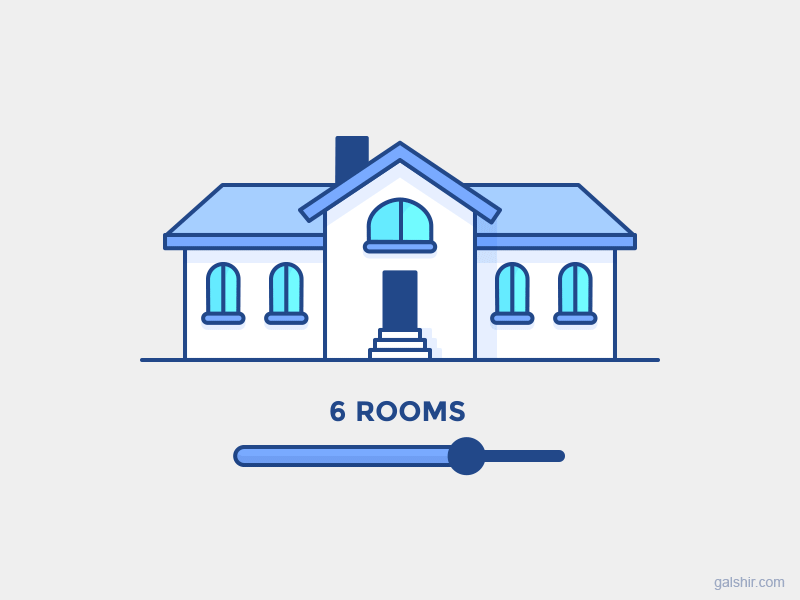Implementing motion using Angular
Gerard Sans | @gerardsans

Google Developer Expert

Google Developer Expert
International Speaker

Spoken at 89 events in 25 countries

Blogger
Blogger
Community Leader

900
1.5K
Angular Trainer

Master of Ceremonies

Master of Ceremonies
















Angular Academy

Why introduce motion?
Improved UX ✨

Perceived Performance


Immersive interactions

Better engagement

User happiness 😃

Animation Principles

Squash & Stretch + Anticipation

Follow through

Exaggeration

Composition
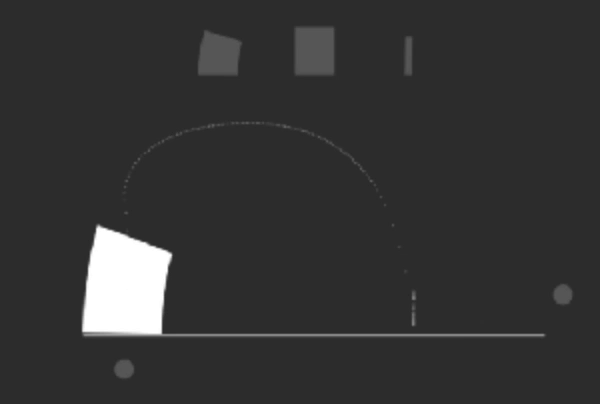
CSS Animations









DURATION
0%
100%
CSS Animations
KEYFRAMES
CSS Animation
NAME
animation: fade 5s 1s infinite linear;
DURATION
DELAY
ITERATIONS
TIMING
Animatable CSS
all background* border* bottom box-shadow clip clip-path color filter font* height left margin* mask* offset* opacity outline* padding* perspective* right text-decoration text-shadow top transform vertical-align visibility width z-index
timing function/easing
60 FPS
Smooth 60FPS
60 FPS
Time
16.66ms
16.66ms
16.66ms
1000/60ms
paint
frame
paint
frame
paint
frame
😃
paint
frame
paint
frame
Losing Frames!
60 FPS
Time
16.66ms
16.66ms
16.66ms
😱
Motion Techniques
Move
transform: translateX(10px);
Resize
transform: scale(0.5);
Rotate
transform: rotate(1turn);
Fade
opacity: 0;




Move

<div class="circle base elastic"></div>
.base {
animation: move 2s infinite;
}
.elastic {
animation-timing-function:
cubic-bezier(.8,-0.6,0.2,1.5);
}
@keyframes move {
0% {
transform: translateX(-250px);
}
40%, 60% {
transform: translateX(50px);
}
100% {
transform: translateX(250px);
}
}Rotate

<div class="square base linear"></div>
.base {
animation: spin 2s infinite;
}
.linear {
animation-timing-function: linear;
}
@keyframes spin {
to {
transform: rotate(1turn);
}
}Resize

<div class="circle base"></div>
.base {
animation: size 2s infinite;
}
@keyframes size {
0%, 40%, 100% {
transform: scale(1);
}
25%, 60% {
transform: scale(1.1);
}
}Fade

<div class="circle base elastic"></div>
.base {
animation: fade 2s infinite;
}
@keyframes fade {
0% {
transform: translateX(0px);
opacity: 0;
}
40%, 60% {
transform: translateX(80px);
opacity: 1;
}
100% {
transform: translateX(0px);
opacity: 0;
}
}Angular Animations
States & Transitions
fadeIn
fadeOut
Fading animation
TRANSITIONS
STATE
STATE
fadeIn => fadeOut
fadeOut => fadeIn
opacity: 1
opacity: 0
animate('400ms linear')
animate('400ms linear')
fadeOut <=> fadeIn
animate('400ms linear')
Fading an Element
import {fade} from './animations';
@Component({
selector: 'my-app',
template: `<button [@fade]='fade' (click)="toggleFade()">Fade</button>`,
animations: [ fade ]
})
export class App {
fade = 'fadeIn';
toggleFade(){
this.fade = this.fade === 'fadeIn' ? 'fadeOut' : 'fadeIn';
}
}Fading Animation
import {
trigger, transition, state, style, animate
} from '@angular/animations';
export const fade = trigger('fade', [
state('fadeIn', style({ opacity: 1 })),
state('fadeOut', style({ opacity: 0 })),
transition('fadeIn <=> fadeOut', animate('400ms linear'))
]);Dynamic Animations
Builder
`(${x}, ${y})`
(100, 50)
Player
Template
1
2
(100, 50)
3
build()
play()
AnimationBuilder
import {AnimationBuilder} from "@angular/animations";
export class MyComponent {
constructor(
private elem: ElementRef,
private builder: AnimationBuilder
) {
const player = this.playerMoveTo({ x: 100, y: 100 });
player.play();
}
playerMoveTo(to) {
const moveAnimation = this.builder.build([
animate('1s', style({ transform: `translate(${x}px, ${y}px)` }))
]);
return moveAnimation.create(this.elem.nativeElement
, {params: { x: to.x, y: to.y }});
}
}
Tracking mouse position
constructor(
private elem: ElementRef
) {
// find out center
this.mx = elem.nativeElement.offsetWidth/2;
this.my = elem.nativeElement.offsetHeight/2;
}
ngOnInit() {
const mouseMove$ = fromEvent(document, 'mousemove')
.pipe(map(e => ({ x: e.pageX, y: e.pageY })));
mouseMove$.subscribe({
next: e => {
this.lastPosition = { x: e.x-this.mx, y: e.y-this.my };
const player = this.playerMoveTo(this.lastPosition);
player.play();
}
})
}Motion Design
Principles
Easing
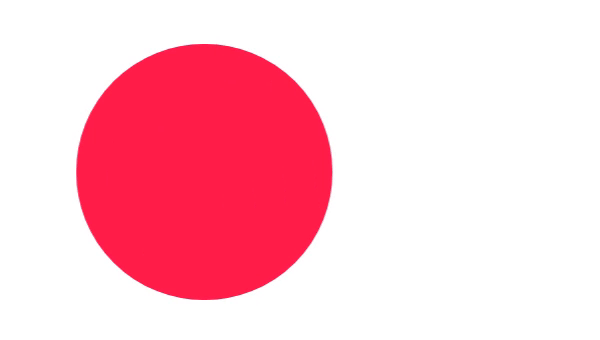

Offset Delay

Parenting

Binding Values

Overlay

Applying
Motion

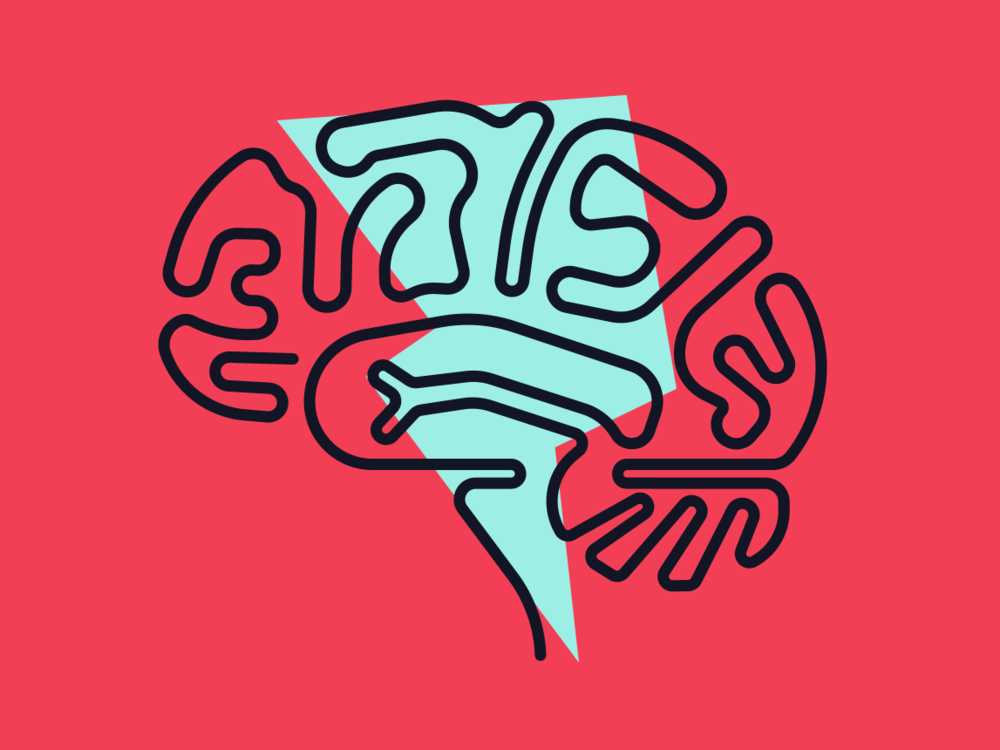


Example
Adding Motion
void
*
Animating new items
void => *
STATE
STATE
:enter
scale(1)
opacity 1
scale(0.5)
opacity 0
*
void
Animating removed items
* => void
STATE
STATE
:leave
scale(0.5)
opacity 0
scale(1)
opacity 1
Execution Order
sequence
group
time
Dynamic Selectors
class="container"
class="item"
class="item"
query(selector)
Dynamic Selectors
query('.item')
class="container"
class="item"
class="item"
Dynamic Selectors
query('.item:enter')
class="container"
class="item"
class="item"
class="item"
added
Composition
animateChild
time
Stagger
time
More
Influencers



David Khourshid
Issara Willenskomer
Sarah Drasner

Rachel Nabors

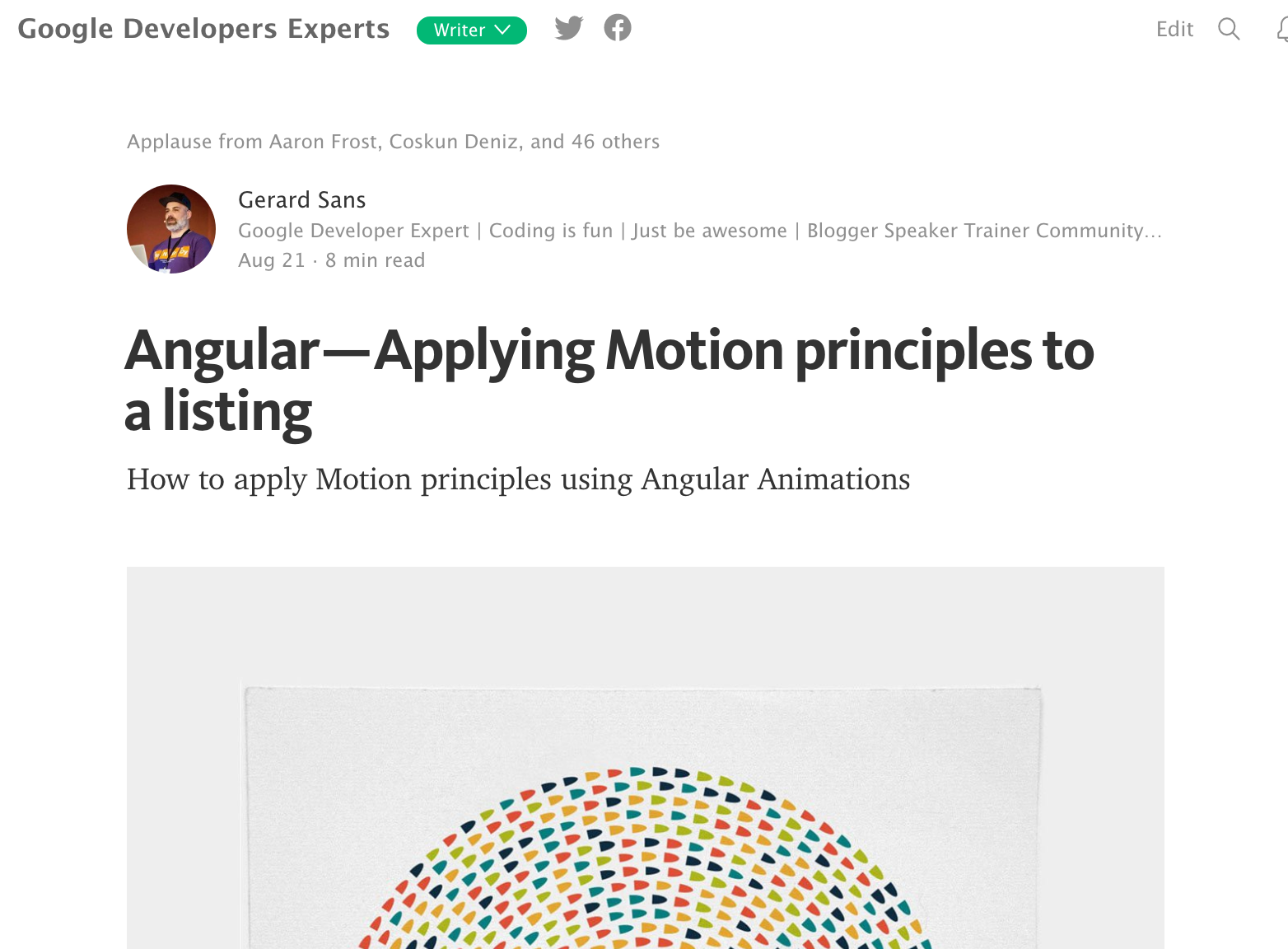

Implementing Motion using Angular
By Gerard Sans
Implementing Motion using Angular
In this talk we are going to cover some of the 12 principles behind UX Motion giving practical examples. We will focus on these principles while covering some implementation details.
- 5,035



